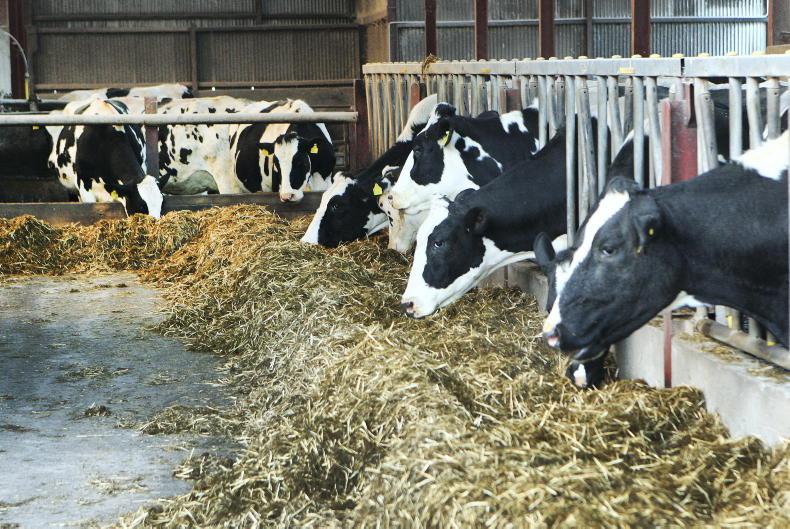Reducing the national cattle herd “may well have to become Government policy in due course,” according to Climate Change Advisory Council (CCAC) chair Marie Donnelly.
On agricultural emissions, Donnelly said that “if we want to go further faster, we have to reduce activity”.
She said this is a “nice way of saying” national cattle numbers will have to reduce.
Donnelly was speaking at the Oireachtas Joint Committee on Environment and Climate Action during a discussion on Ireland’s carbon budgets, which were set out in the Government’s Climate Action Plan last month.
Caution
However, on the area of reducing the national herd, Donnelly urged caution.
“It’s not quite the stroke of a pen that you can make these decisions.”
She warned that such action would have a huge impact on family farm incomes and the rural economy.
She described the first step as needing to be “stopping further increases” in bovine methane production in Ireland and said technology and research rolled out and undertaken by Teagasc has a huge role to play in achieving this.
COP26
When pressed by members of the committee on the fact that Ireland willingly signed up to a 30% reduction in methane emissions at the COP26 climate conference last month, Donnelly highlighted that this is a “global target”.
She explained that the United States (US), a major contributor to global bovine methane emissions, has not “talked about cow numbers at all” and that “the word cow doesn’t appear in the policy paper”.
Instead, she said the US is considering ways of reducing overall methane emissions through improving waste disposal measures and other high methane contributing areas of its economy.
However, despite this comparison, on Ireland’s national herd, she said it is “something that will have to be looked at”.
Forests
Donnelly described Ireland’s current difficulty with afforestation due to Government licensing issues.
“It was something of a shock [to CCAC] that our forests are in such bad condition.”
Reflecting on afforestation activity in recent years, she said: “We have not achieved our target in any year. We have not replaced our forestry and allowed it to build up.”
She said the “absence of doing that has led to only 8% to 10%” of the country being covered by forest when other EU countries are already reaching 20% land area cover and higher.
Read more
Climate Action Plan: farming’s sectoral target lands as expected
Reducing the national cattle herd “may well have to become Government policy in due course,” according to Climate Change Advisory Council (CCAC) chair Marie Donnelly.
On agricultural emissions, Donnelly said that “if we want to go further faster, we have to reduce activity”.
She said this is a “nice way of saying” national cattle numbers will have to reduce.
Donnelly was speaking at the Oireachtas Joint Committee on Environment and Climate Action during a discussion on Ireland’s carbon budgets, which were set out in the Government’s Climate Action Plan last month.
Caution
However, on the area of reducing the national herd, Donnelly urged caution.
“It’s not quite the stroke of a pen that you can make these decisions.”
She warned that such action would have a huge impact on family farm incomes and the rural economy.
She described the first step as needing to be “stopping further increases” in bovine methane production in Ireland and said technology and research rolled out and undertaken by Teagasc has a huge role to play in achieving this.
COP26
When pressed by members of the committee on the fact that Ireland willingly signed up to a 30% reduction in methane emissions at the COP26 climate conference last month, Donnelly highlighted that this is a “global target”.
She explained that the United States (US), a major contributor to global bovine methane emissions, has not “talked about cow numbers at all” and that “the word cow doesn’t appear in the policy paper”.
Instead, she said the US is considering ways of reducing overall methane emissions through improving waste disposal measures and other high methane contributing areas of its economy.
However, despite this comparison, on Ireland’s national herd, she said it is “something that will have to be looked at”.
Forests
Donnelly described Ireland’s current difficulty with afforestation due to Government licensing issues.
“It was something of a shock [to CCAC] that our forests are in such bad condition.”
Reflecting on afforestation activity in recent years, she said: “We have not achieved our target in any year. We have not replaced our forestry and allowed it to build up.”
She said the “absence of doing that has led to only 8% to 10%” of the country being covered by forest when other EU countries are already reaching 20% land area cover and higher.
Read more
Climate Action Plan: farming’s sectoral target lands as expected






 This is a subscriber-only article
This is a subscriber-only article










SHARING OPTIONS: